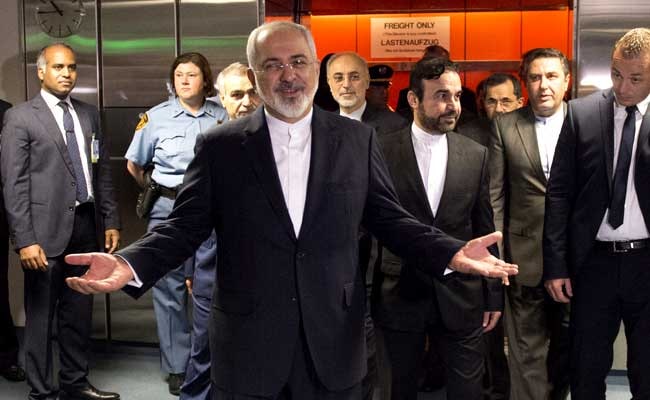
Iranian Foreign Minister Mohammad Javad Zarif. (AFP Photo)
DAVOS, Switzerland:
Iran said on Wednesday it was up to a United Nations envoy to decide who should represent Syrian opposition forces in international peace talks due to start this month.
Foreign Minister Javad Zarif told a news conference at the World Economic Forum in Davos that the opposition delegation at the centre of fierce diplomatic dispute should not include members of three internationally recognised "terrorist groups".
Those were Islamic State, also known as ISIS or Daesh, al Qaeda and the Nusra Front, he said, adding that 10 "card-carrying members" of al Qaeda had attended an opposition meeting in Riyadh, Saudi Arabia, convened to form a delegation for the Geneva talks.
Neither ISIS nor Nusra Front - al Qaeda's Syrian affiliate - were represented at last month's opposition meeting in Saudi Arabia which agreed to work towards peace talks with President Bashar al-Assad. Representatives of other Islamist factions, including the powerful Ahrar al-Sham, did take part.
But Zarif said it was not up to Iran to decide who attended the talks. "That is for Mr de Mistura to decide who will participate and I'm sure he'll apply those criteria," he said.
Russia's Foreign Minister Sergei Lavrov, speaking in Zurich after talks with US Secretary of State John Kerry on Wednesday, said the peace talks should start this month as planned, despite lack of agreement so far on who should participate.
Asked about Western demands that Assad should leave power as part of any settlement in Syria, the Iranian minister said it made no sense to set preconditions before the talks even began.
Syria's civil war had dragged on for nearly five years because many countries were entrenched in the position that Assad must go before there could be a political process.
"You cannot determine the outcome of this political process before it starts. You do not enter a negotiating room with the outcome already decided," Zarif said.
He repeated Tehran's insistence that it was up to Syrians to decide Assad's fate through elections after a new constitution is negotiated in peace talks.
Asked whether he planned to meet any Saudi figures on the sidelines of the annual WEF session to try to improve ties after Riyadh broke off diplomatic relations this month, Zarif said: "There won't be a secret meeting here."
He said Tehran had not broken off relations nor responded to what he called extensive Saudi provocations, including millions of dollars spent lobbying the US Congress against last July's international agreement on Iran's nuclear programme that led to the lifting of most sanctions on Tehran this week.
Iran's Supreme leader, Ayatollah Ali Khamenei, had condemned the storming of the Saudi embassy in Tehran that led to the rupture, after Saudi Arabia executed a leading Shi'ite Muslim clerical opponent, Zarif said.
"I believe that the Saudi Arabians should come to their senses and understand that they have a much better future in collaboration and coordination and accommodation with Iran, and we are ready for that," he added.
Foreign Minister Javad Zarif told a news conference at the World Economic Forum in Davos that the opposition delegation at the centre of fierce diplomatic dispute should not include members of three internationally recognised "terrorist groups".
Those were Islamic State, also known as ISIS or Daesh, al Qaeda and the Nusra Front, he said, adding that 10 "card-carrying members" of al Qaeda had attended an opposition meeting in Riyadh, Saudi Arabia, convened to form a delegation for the Geneva talks.
Neither ISIS nor Nusra Front - al Qaeda's Syrian affiliate - were represented at last month's opposition meeting in Saudi Arabia which agreed to work towards peace talks with President Bashar al-Assad. Representatives of other Islamist factions, including the powerful Ahrar al-Sham, did take part.
But Zarif said it was not up to Iran to decide who attended the talks. "That is for Mr de Mistura to decide who will participate and I'm sure he'll apply those criteria," he said.
Russia's Foreign Minister Sergei Lavrov, speaking in Zurich after talks with US Secretary of State John Kerry on Wednesday, said the peace talks should start this month as planned, despite lack of agreement so far on who should participate.
Asked about Western demands that Assad should leave power as part of any settlement in Syria, the Iranian minister said it made no sense to set preconditions before the talks even began.
Syria's civil war had dragged on for nearly five years because many countries were entrenched in the position that Assad must go before there could be a political process.
"You cannot determine the outcome of this political process before it starts. You do not enter a negotiating room with the outcome already decided," Zarif said.
He repeated Tehran's insistence that it was up to Syrians to decide Assad's fate through elections after a new constitution is negotiated in peace talks.
Asked whether he planned to meet any Saudi figures on the sidelines of the annual WEF session to try to improve ties after Riyadh broke off diplomatic relations this month, Zarif said: "There won't be a secret meeting here."
He said Tehran had not broken off relations nor responded to what he called extensive Saudi provocations, including millions of dollars spent lobbying the US Congress against last July's international agreement on Iran's nuclear programme that led to the lifting of most sanctions on Tehran this week.
Iran's Supreme leader, Ayatollah Ali Khamenei, had condemned the storming of the Saudi embassy in Tehran that led to the rupture, after Saudi Arabia executed a leading Shi'ite Muslim clerical opponent, Zarif said.
"I believe that the Saudi Arabians should come to their senses and understand that they have a much better future in collaboration and coordination and accommodation with Iran, and we are ready for that," he added.
© Thomson Reuters 2016
Track Latest News Live on NDTV.com and get news updates from India and around the world

